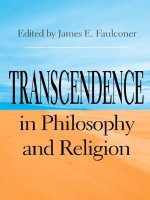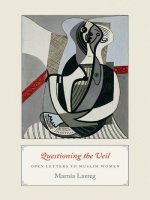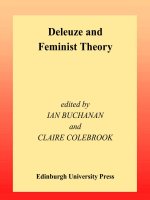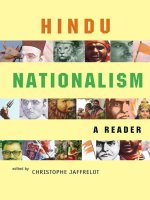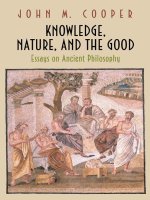princeton university press tragedy and philosophy sep 1992
Bạn đang xem bản rút gọn của tài liệu. Xem và tải ngay bản đầy đủ của tài liệu tại đây (15.63 MB, 410 trang )
TRAGEDY
AND
PHILOSOPHY
OTHER
BOOKS
BY
WALTER
KAUFMANN
Nietzsche
(1950; 3d
rev.
and
enl.
ed.,
1968)
Critique
of
Religion
and
Philosophy
(1958)
From
Shakespeare
to
Existentialism (1959;
rev.
and enl. ed., 1060)
The
Faith
of
a
Heretic
(1961)
Hegel
(1965)
VERSE
Goethe's
Faust:
A
New
Translation
(1961)
Cain and Other
Poems
(1962)
Twenty Gennan
Poets
(1962)
TRANSLATED AND
EDITED
Existentialism
from
Dostoevsky
to
Sartre
(1956)
Judaism
and Christianity:
Essays
by
Leo
Baeck
(1958)
Philosophic
Classics
(2
vols., 1961,
rev.
and enl., 1968)
Religion
from
Tolstoy
to
Camus
(1961)
Hegel:
Texts
and
Commentary
(1966)
NIETZSCHE TRANSLATIONS
The
Portable
Nietzsche
(1954:
Thus
Spoke
Zarathustra,
Twilight of
the
Idols,
The Antichrist, and Nietzsche
contra
Wagner)
Beyond
Good
and
Evil,
with
Commentary
(1966)
The
Birth
of
Tragedy
&
The
Case
of
Wagner,'
with
Commentary
(1967)
On
The
Genealo8Y
of
Morals
&
Ecce
Homo,
with
Commentary
(1967)
The
Will
to
Power,
with
Commentary
(1967)
TRAGEDY
AND
PHILOSOPHY
Walter
Kaufmann
PRINCETON UNIVERSITY
PRESS
PRINCETON,
NEW
JERSEY
Published
by
Princeton University Press, 41 William Street,
Princeton, New Jersey
08540
Copyright © 1968
by
Walter Kaufmann;
All Rights Reserved
Library
of
Congress Card No. 78-73428
ISBN
0-691-02005-1
(paperback)
Originally published in hardcover edition
by
Doubleday
and
Company,
Inc.,
1968; Anchor Books edition,
1969
First Princeton Paperback printing, 1979; Princeton University Press
edition reissued,
1992
10
9 8 7 6
The
selection from Richmond Lattimore's translation
of
The
Odyssey, Book
XI,
is
quoted
with
the permission
of
Harper
& Row, Inc.
The
lines quoted from
E.
V. Rieu's prose version
of
The Iliad
are by permission of Penguin Books, Ltd.
The
material from The Complete Greek
Tragedje~"
edited by
David Grene and Richmond Lattimore,
is
incorporated
with the permission
of
the University of Chicago Press.
The
short quotations from
On
Poetry
and Style are
by
permission
of
The
Bobbs-Merrill Company. From Aristotle:
On
Poetry
and Style, translated
by
C.M.A.
Crube, copyright
1958
by
The
Liberal Arts Press, Inc
.•
reprinted by permission
of
The
Liberal Arts Press Division
of
the Babbs-Merrill Company,
Inc.
Princeton University Press books are printed on acid-free paper
and
meet
the guidelines for permanence and durability
of
the
Committee
on Production Guidelines
for
Book Longevity of the
Council on Library Resources
Printed in the United States
of
America
FOT
my
son
DAVID
PREFACE
(1979)
Xl
ACKNOWLEDGMENTS
Xlll
INTRODUCTION
XV
PROLOGUE
XIX
I
PLATO:
THE
RIVAL
AS
CRITIC
1 Before Plato
1
2
P1ato's
references to the
Big
Three 8
3
Republic
,76-40,
10
4
Republic
VI-VII
and X
17
5
Plato
as
a tragic poet
22
6
The
Laws
25
II
ARISTOTLE:
THE
JUDGE
WHO
KNOWS
7
Introduction
to
the
Poetics
3
0
8
Aristotle's definition
of
tragedy
33
9
mimesis
3
6
10
spoudaios (noble)
41
11
"pity and
fear"?
43
12
catharsis
49
13
The
six
elements-
spectacle and thought
52
14
plot and its primacy
55
viii
III
IV
V
VI
hamartia
and
hybris
happy end
TOWARD
A
NEW
POETICS
17
Beyond Plato and Aristotle
18
Imitation-and
a new definition of tragedy
19
The
work's relation
to
its author
20
The
philosophical dimension
THE
RIDDLE
OF
OEDIPUS
:2.1
Three classical interpretations
22
The
historical context
23
Man's radical insecurity
2.4
Human blindness
.25
The
curse of honesty
.26
The
inevitability of tragedy
27
Justice
as
problematic and the
five
themes
28
Oedipus
versus
Plato
HOMER
AND
THE
BIRTH
OF
TRAGEDY
29
How Homer shaped Greek tragedy
3
0
The
gods
in the Iliad
3
1
Neither belief nor dualism
3
2
The
matter of weight
33
Man's lot
Contents
75
7
8
87
9
2
102
108
II;
117
120
126
12
9
133
136
143
14
8
15
2
154
AESCHYLUS AND
THE
DEATH
OF
TRAGEDY
34
Nietzsche and the death of tragedy
16
3
35
What
we
know of Aeschylus
166
3
6
Orestes in Homer
169
Contents
ix
37
Aeschylus·
CCoptirnism"
174
3
8 How he
is
more tragic
than
Homer
180
39
Character in
the
Iliad and Oresteia
18
3
4
0 How tragedy did
and
did
not
die
H}O
VII
SOPHOCLES:
POET
OF
HEROIC
DESPAIR
41
Nietzsche
and
Sophocles' "cheerfulness"
195
42
Hegel's "theory of tragedy"
200
43
Ajax
212.
44
Antigone
21
5
45
The
Women
of
Trachis
and
Electra
225
4
6
Philoctetes
and
Oedipus at Colonus
23
2
47
Sophocles' "humanism"
23
6
VIII
EURIPIDES,
NIETZSCHE,
AND
SARTRE
4
8
In
defense
of
Euripides
242
49
Euripides' Electra
247
50
Was
Euripides
an
"irrationaHse'?
253
51
Nietzsche's influence
on
The
Flies
25
8
52
Are Dirty Hands and
The
Flies tragedies?
26
3
IX
SHAKESPEARE
AND
THE
PHILOSOPHERS
53
Testing the phi1osophers
27
0
54
Aristotle
and
Shakespeare
27
2
55
Hegel on Shakespeare
279
56
Hume's essay l40f Tragedy"
28
7
57
Schopenhauer on tragedy
29
0
58
Nietzsche versus Schopenhauer
2~
59
Max Scheler
and
"the tragic"
3
00
x
Contents
X
TRAGEDY
TODAY
60
Tragic events and
4lthe
merely pathetic"
309
61
Can
tragedies be written today?
317
62.
The
Deputy
as
a modern Christian tragedy 32.2
63
Tragedy versus history:
The
Deputy and
Sol-
diers
331
Brecht's
Galileo
337
The
Confessions
of
Nat Turner
347
66
The
modernity of Greek tragedy; prospects
354
EPILOGUE
359
A NOTE
ON
TRANSLATIONS 3
66
INDEX
380
PREFACE
(1979)
I am delighted that the Princeton University Press
is
bringing together under
its
imprint several
of
my
books.
The
relation
of
Tragedy
and
Philosophy
to
Nietzsche
and
Critique
of
Religion
and
Philosophy
makes this even more grat-
ifying. In my
Nietzsche
I considered it my duty
to
present
his
ideas. Some
philosophers, of course, have the habit
of
reading their own ideas into their
predecessors. This strikes me
as
a
way
of
betraying a master with a
kiss.
Nor
do I feel that a book about another philosopher
is
the place
to
show why one
thinks that
he
was
wrong and then to present one's own views. I began
to
develop my own ideas in
Critique
of
Religion
and
Philosophy,
and in
Tragedy
and
Philosophy
my critique
of
philosophy
is
carried further.
In this book
I do not merely consider and criticize the doctrines about trag-
edy found in Plato and Aristotle,
Hume
and Hegel, Schopenhauer, Nietzsche,
and Scheler,
but
I call into question the
way
philosophers have dealt with
tragedy, offering all kinds
of
grand generalizations without considering in detail
a single tragedy. My own analysis of tragedy involves a reexamination of
Homer and Aeschylus, Sophocles and Euripides, Shakespeare, and three
twentieth-century playwrights. In the process quite a
number
of
plays are stud-
ied in detail, and one whole chapter
of
forty pages
is
devoted
to
Sophocles'
Oedipus
Tyrannus.
When
I published the book, my interpretation of
Oedipus
and my concep-
tions of Aeschylus, Sophocles, and Euripides, and of the death of
tragedy-all
diametrically opposed to Nietzsche's views-struck
me
as
far more interesting
and important than my definition of tragedy. For that matter, some
of
the
other aspects of the new poetics advanced in Chapter
III
also seemed more
significant to me than a mere definition.
In retrospect it seems
to
me that
Tragedy
and
Philosophy
marks a decisive
step toward my analysis
of
the human condition in
Man's
Lot, which appeared
xu
Preface
exactly ten
years
later.
In
the
first
part of that trilogy,
Life
at
the
Limits, my
critique of traditional philosophy
is
taken
still
further. The third chapter,
"Western Philosophy,"
begins:
"Philosophy
is
a branch of literature
in
which
suffering and extreme situations
have
traditionally been
largely
ignored."
Taken out of context, that
may
sound moralistic, but
in
fact
my
critique of
philosophy
is
nowhere near
as
moralistic
as
was
Plato's critique of the tragic
poets.
We
should abandon the presumption that philosophers reside,
as
it
were,
in
an impregnable
fortress
from
which they can
pass
judgment
on
trag-
edy
and everything
else.
If
we
want
to
gain
a deeper understanding
.of
the
human condition and consider
life
at the limits,
vita
in
extremis,
or
the ques-
tion "What
Is
Man?"
we
are
quite apt
to
learn more
from
the
great tragic poets
and
from
a
few
other
writers
and
artists
than
from
philosophers. But I
do
not
believe that philosophy
needs
to
be
as
unhelpful
in
these matters
as
it
has
been.
In
the
first
volume of another
trilogy,
Discovering
the
Mind (1979), I
have
tried
to
show
at length what
is
wrong
with
philosophy a
la
Kant. But
for
thirty
years
now
the
critical thrust of
my
own
work
has
been inspired
by
a vision of another
kind of philosophy.
This
was
surely obvious
from
the beginning. For all
my
differences with
Nietzsche and Hegel,
my
books
on
them
left
no
doubt about
my
admiration
for
their daring.
And
in
Tragedy
and
Philosophy
I
write
mainly about what I
love
and
find
beautiful.
Sinee
this
book
first
appeared, I
have
not taught
tragedy.
While
working
on
it,
I did a
few
times.
Once, in
the
mid-sixties, a student
visited
me
at
my
home
and said
at
one point, affectionately:
"You
really
can't expect
us
to
sympathize
or
identify with
all
that suffering." I
like
to
believe that he
was
quite unrepre-
sentative. Perhaps
he
would not
even
have
sought
me
out if he had
really
meant that. Surely, a great many other people must
feel
as
I
do
that the
enorw
mollS
sufferings
of
so
much of humanity
pose
a profound problem
for
us.
This
book
represents a sustained attempt
to
cornelo
grips
with
this
problem.
W.K.
Princeton,
Lincoln's
Birthday,
1979
ACKNOWLEDGMENTS
For bibliographic help I am indebted
to
George
Brakas
and Peter Pope,
my
undergraduate research assistants-and
to
Princeton University
for
providing
this aid.
Mr.
Pope
also
did
most of
the
work
on the
Index.
*
In
1962-63, when I
had
a Fulbright grant
to
the
Hebrew
University in
Je-
rusalem, I
was
asked
to
lecture once a
week
for
two
hours
on
Literature and
Philosophy. I
was
told
to
expect a
small
class
and
agreed,
hoping
to
rely
largely
on what I
knew;
for
I
was
planning
to
work
mainly on another project. But the
audience turned out
to
be
very
large
and included many distinguished people.
I had
to
do
a
Jot
of
work
to
prepare
my
lectures, but enjoyed
it
immensely and
feel
profoundly indebted
to
my
wonderfully responsive listeners.
What I returned
to
Princeton, I
was
asked
to
give
a similar course. Finally,
when Princeton granted
me
another leave,
in
1966-67, I
was
able
to
complete
a draft of the present
book.
Part of that time, during the
fall,
I enjoyed the
hospitality of Purdue University,
where
I
was
philosopher~in-residence
and
had
no
duties.
And
in
the
fall
of
1967
my
teaching
load
was
light enough
to
permit
me
to
finish
the
book,
while three of
my
Princeton colleagues
read
a
draft and
gave
me
the benefit of their extremely stimulating comments:
Richard
Rorty
and
Stuart Hampshire
read
the whole
David
Furley of our
Classics Department the
first
seven chapters. I am
glad
of this opportunity
to
thank them
for
their kindness, generosity and help.
In January
1968 I turned
over
the manuscript
to
Anne Freedgood at Dou-
bleday-an
esteemed since 1959,
whose
promptness and reliability never
cease
to
amaze me. Surrendering a manuscript with which one has
lived
for
XIV
Acknowledgments
years can precipitate a sudden sense of the void.
One
has no right to expect
anything for a long time, and may actually be glad to have accumulated in-
numerable obligations while one
gave
one's sale attention to finishing the
book. But before
I had finished even the most necessary chores, I got a long
letter from Anne Freegood with detailed
comments-fortunately,
none
of
them required much more work on
my
part-and
soon Robert Hewetson, an-
other superb editor, gave me the benefit of his exceptionally careful and dis-
cerning queries.
Writing
is
a solitary art,
but
in the final
stages
of my work on this book I
have thus been cheered by friends. Living with tragedy) where solitude
is
often
felt to be absolute, friendship
is
experienced intensely) kindness
is
cause for
profound gratitude, and loyalty seems like a rock in a flood.
A
NOTE
ON
THE
PAPERBACK
EDITION
This edition
is
unabridged and embodies some minor improvements. I
am
grateful to Professors Gerald Else and Charles Segal
for
their detailed com-
ments on the original edition.
INTRODUCTION
1
The
most inAuential reAections on tragedy are those of a
few
philosophers
who will be considered in this book.
Ivly
ambition
is
to get straight their
views, find
out
to what extent their ideas stand up under examination,
and fonow in their footsteps.
In many ways, however, I do
not follow in their footsteps: I argue
against many
of
their ideas, impugn their methods, and do
not
share their
presumption
that
they are wiser than, say, Sophocles. Although I should
never call him a i4philosopher," I have far more respect for his wisdom
than
Plato and Aristotle did.
As
for Nietzsche, I shall give reasons for rejecting
his
ideas about both the birth and the death of tragedy, and my
views
of
Aeschylus, Sophocles, and Euripides will be seen to be diametrically op·
posed to his.
This book
is
addressed to those sufficiently interested in tragedy to
care about Aristotle's
Poetics
and Nietzsche's Birth of Tragedy, as well
as
the
views
of Plato
and
Hegel. There are no Greek letters,
but
the
mean-
ings of some Greek words-mimesis,
hybris,
catharsis,
and a
few
others
that are not quite so
familiar-are
discussed. My books on Nietzsche
and
Hegel were not addressed only to those
at
home in German,
and
I am
not
now writing only for classical philologists;
but
it
is
my hope
that
my sug-
gestions and interpretations will be accepted by scholars.
For whom did
Plato and Nietzsche write, or Aristotle and Hegel, or
Hume and Schopenhauer, when they discussed tragedy? This book, like
theirs, bridges disciplines.
The
fact
that
even good philologists are generally uninformed in their
comments on Hegel's
and
Nietzsche's views and often quote them from
discredited translations might
be
taken as a forcible reminder
that
it
is
XVI
Introduction
safer
to
stay in one's own field.
But
anyone who prefers safety
is
not
likely
to have much feeling for Greek tragedy, and I prefer a different lesson:
most efforts in this direction have been none too successful,
but
there
is
a
widely felt need for seeing together materials
that
are too often consid-
ered apart.
2
My
central aim
is
to develop a sound
and
fruitful approach to tragedy, try
it
out, and thus illuminate Greek tragedy
and
some problems relating to
the possibility and actuality of tragedy in our time.
To
believe
that
entirely
on
my own I could do better than Plato and
Aristotle, Hegel and Nietzsche, would be presumptuous.
To
hope
that
I
may learn from them and, with the aid of
what
has been written and
thought since their day, come up with a sounder approach
is
not
unrea-
sonable.
At
least
it
is
worth a try.
Since my
intent
is
above all constructive
and
this
is
not
primarily a
history of criticism, I offer a sketch of a new poetics in
the
third chapter,
immediately after considering Plato and Aristotle, and
at
once apply
it
to
Sophocles'
Oedipus Tyrannus, which from Aristotle's time to our own day
has generally been
regarded-rightly-as
a tragedy
that
is
as
great as any.
The
chapter
on
"The
Riddle of Oedipus"
is
a sort of crucial experi-
ment.
If
my reading of
that
play
is
more illuminating
than
the standard
interpretations from Aristotle
to
Freud, an initial plausibility has been
es-
tablished for my own poetics.
But
theories of tragedy always run the risk
of being based, even if not consciously, on one great tragedy and of com-
ing to grief when applied to others.
It
is
a
commonplace-though
wrong-
that
Hegel's /ltheory"
fits
only the Antigone, while Aristotle's
is
derived
from
Oedipus Tyrannus and fits only Sophoclean tragedy. And many
widely read twentieth-century
essays
on tragedy run afoul of most Greek
tragedies.
Hence Chapter V
goes
back to /4Homer
and
the Birth of Tragedy,"
both to show how my approach can be applied
to
The
Iliad
and
to furnish
a much needed background for an understanding of Aeschylus,
Sophocles~
and Euripides, who are considered in the next three chapters.
There
is
no stopping
at
this point.
We
have to see how Aristotle's
and Hegel's ideas about tragedy,
so
far considered only in conjunction
with Greek tragedy, fare when applied to Shakespeare. And this seems to
be
the best place
to
go
on to Hume's
and
Schopenhauer's theories of
Introduction
XVII
tragedy, because
both
were concerned with Shakespeare
at
least
as
much
as
they were with the Greeks. Both dealt with the same question:
Why
do
tragedies
give
pleasure?
Finally,
we
come to our own century. Sartre
is
considered
in
the
Eu-
ripides chapter, because
The Flies invites comparison with Electra.
But
in the end
we
take up a recent "phenomenologicar' theory of
Hthe
tragic,"
ask whether events can be tragic, whether some of the events
of
our time
are
not
particularly tragic, and whether tragedies can
be
written today.
Then
I consider Rolf Hocbhuth's The Deputy
as
an
attempt
to write a
modern Christian tragedy,
as
well
as
his
attempt
to
make a tragic hero
out
of Churchill in
Soldiers.
The
last playwright discussed
is
Bertolt Brecht
who sought to break with
the
whole (lAristotelian" tradition of the drama.
My findings about the Greeks are used to illuminate Hochhuth and
Brecht
t
and the drama of our times
is
used
to
gain a better understanding
of the Greeks.
3
I pay
mOre
attention to rival
views
than
is
customary. Whatever I write
abont,
it
always
seems to me
that
the reader has a right to know
the
cur-
rent state of thought about the subject, and
that
what
is
new and different
should be distinguished from what
is
generally accepted.
The
habit of try-
ing to
put
over controversial suggestions without
the
least warning,
as
if
they were evident facts, seems
as
objectionable to me
as
the no
less
com-
mon habit of presenting
as
one's own insights ideas plainly gleaned from
Hegel or Nietzsche.
Much writing these days
is
either for non-specialists, who are
not
expected to care about the literature, or for specialists, who are expected
to be familiar with
it
without being told about it.
But
it
is
worthwhile to
reach
also
men and women who know what scholarship means
but
may
not have taken the time to study our subject intensively.
The
following Prologue, which
is
sharply different from the rest of
the
book,
was
written after the draft
was
finished.
If
one had to pretend
that
it
was
addressed to somebody, one would have to say
that
it
was
clearly not
intended for scholars
but
was
meant to
give
others some idea of an unsus-
pected dimension of research and writing.
But
in truth one does
not
al-
ways
write for a living audience. Being read
is
a fringe benefit, and being
read with understanding
is
a form of grace.
Scholarship
is
an opiate for intellectuals, but it
does
not affect
all
men
the
same
way.
Some it transports into a dull stupor; others enjoy incredible
trips into fabulous dimensions.
Unlike other drugs, research
is
cumulative and
offers
continuity. In-
terrupted
voyages
can be taken up again, and
we
can land
at
whim to
ex-
plore now this region, now that
age.
Thus
we
can live
several
lives,
at
various speeds.
Writing
is
thinking in
slow
motion.
We
see
what
at
normal speeds
escapes
us,
can rerun the
reel
at
will
to look for errors, erase, interpolate,
and rethink. Most thoughts are a light rain, fall upon the ground,
and
dry
up.
Occasional1y
they become a stream that runs a short distance before
it
disappears. Writing stands an incomparably better chance of getting
somewhere.
Paintings and sculptnres are
also
new
worlds,
but
confined by space;
and
if the artist wants many people to share them, he must part with his
works.
What
is
written can be
given
endlessly
and
yet retained, read by
thousands
even
while it
is
being rewritten, kept
as
it
was
and revised
at
the same time. Writing
is
magic.
•
The
Christian dream of heaven with its
sexless
angels and insipid
harps betrays the most appalling
lack
of imagination, moral and aesthetic.
Who
could bear such music, sights, monotony, and inactivity for one
whole month without discovering that
it
was
nothing
but
hell? Only those
devoid of intellect and sensitivity, poor drudges
who
identify exertion
with oppression.
Wretched brutes, they would enjoy their heaven while the mass of
mankind
suffers
ceaseless
torments. Some trust
that
the spectacle of end-
xx
Prologue
less
tortures will increase their bliss, while others, priding themselves on
their greater sensitivity,
feel
quite certain
that
their ecstasy in heaven will
preclude any remembrance of the sufferings of
the
damned.
*
If
research and writing can dwarf all the pleasures of such heavens,
are
not
the humanists also miserable drudges? Taking an opiate and then
sitting in one's corner, smiling blissfully, oblivious of the torments of one's
brothers,
is
considered as respectable as heaven if the drug
is
scholarship.
But
is
it
less hellish?
And if
we
praise the delights of reading and writing about tragedy,
are we not seeking joy through the contemplation of the sufferings
of
our
fellow men?
Why
seek
out
past sorrows when there
is
more pain and grief
now
than
a man can cope with?
'*
We
have been told
that
tragedy
is
dead,
that
it
died of optimism,
faith in reason, confidence in progress. Tragedy
is
not
dead,
but
what
estranges
us
from
it
is
just the opposite: despair.
After Auschwitz and Nagasaki, a
new
generation wonders how one
can make
so
much
fuss
about Oedipus, Orestes, or Othello.
What's
Hec-
uba to
us?
Or Hamlet?
Or
Hippolytus? Becket's Waiting
for
Godat and
lonesco's
Lesson are
less
optimistic, have less faith in reason, and no con-
fidence
at
all in progress,
but
are closer to
the
feelings of those born dur-
ing or after
World
War
II.
If
the world
is
absurd and a thoughtful person
has a choice
of
different kinds of despair, why should one
not
prefer to
laugh
at
man's
condition-a
black laugh? Above all,
no
affectations, no
idealism, nothing grand.
Philosophers prefer small questions, playwrights small men. Bad
phi-
losophers write in the old vein, bad playwrights about Job and Herac1es,
with some of the old pomp,
but
taking care to make the Ileroes small
enough for our time.
One
takes care .not to
go
to heaven, nor to descend to hell.
One
be-
lieves neither in purgatory nor in purification.
One
can neither face nor
forget reality, neither weep nor laugh.
One
squints, grins and gradually
the heart freezes.
Prologue
XXI
Some trips are
not
pure delights.
One
encounters
terrors~
not
all of
them
remote. Perception
is
painfully heightened.
One
escapes not
so
much from
the
sufferings of others
as
from death by ice.
What
is
sought
is
not
bliss
but
risk.
Even fire sooner than ice.
*
What
is one to
do?
Why
keep trying to deaden
the
heart with opi-
ates, whether drugs or creeping microscopism?
Why
squint?
If
the great tragic poets had been the pompous bores held up
to
us
since our childhood,
it
would be masochism to seek
out
their company_
But suppose Homer's world view turned
out
to
be close to ours, and Soph-
ocles' conventional piety
was
a myth, no
less
than Euripides' optimism.
Suppose their tragedies pulsed with incipient despair, and their concerns
were closer
to
OU1'8
than are those of most
of
our neighbors.
Whoever seeks a moral holiday in art
will
not
find
it
in Attic tragedy.
The
Greek tragic poets call into question not only
the
morality of their
contemporaries
but
also Plato's and Christianity's.
But
they do
not
merely
fashion friezes and ballets, delighting
us
with the extraordinary beauty
of
patterns and movements, though they do that, too; they also indict
the
brutality and inhUmanity of most morality.
*
I am a disciple of the sarcastic Socrates, who
found
much of his mis-
sion in exposing
that
what passed for knowledge was in fact ill-founded
error. But while Socrates and Plato were hard on
the
poets, the tables are
turned in this book
as
we
examine the philosophers' ideas.
The
fact
that
so
much
that
is
widely believed
is
wrong
is
a great in-
centive for research. In this case the
joys
of discovery are increased by
find~
ing buried treasures under the accumulated rubbish
of
centuries.
Hell, purgatory, and heaven are
not
for
us,
except insofar
as
all three
are here and now, on this earth. The great tragic poets knew all three,
and
their visions can illuminate our hell.
AND
PHILOSOPHY
Plato:
The Rt·val as Crttlc
1
All of
us
tend to be historically blind. Like an undergraduate who
says,
(II
have
always
thought that Kant must have been influenced by the
Upani~
shads," most people talk and write
as
if there had
always
been tragedy and
philosophy, and
as
if tragedy had
always
been like this, and philosophy
like that.
In fact, many widely shared assumptions about tragedy fail to fit some
of the best Greek tragedies, and philosophy
is
DO
single entity either.
Western philosophy
was
born early in the sixth century B.C., and tragedy
less
than a hundred
years
later. These dates suggest rather misleadingly
that philosophy
is
the older
of
the two. But sixth-century philosophy
was
very different from fourth-century philosophy, and the
two
fourth-century
philosophers who dealt at length with tragedy, Plato and Aristotle, wrote
their treatises after the major tragic poets were dead. The ancients dated
writers not
by
the year in which they were born
but
by the year in which
they flourished: by that token, philosophy
is
younger. Nor did the two
greatest Greek philosophers merely come after the greatest tragedians;
their kind of philosophy
was
shaped in part by
the
development
of
trag~



